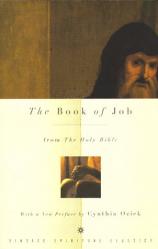Reading Group Guide
Discussion Questions
The Book of Job

1. What current or recurring examples of disaster, cruelty, or loss in history, or in the contemporary news media come to mind most powerfully when you read The Book of Job? What examples of disaster or loss in your own life do you think of? Does your reading of Job's drama shift, change, or deepen your perspective on your life's most awful experiences? On those of history? If so, how?
2. The author of Job makes an effort to frame this highly sophisticated debate with the naive style of a folk tale. How do the opening and closing of Job's story shape your response to its central questions and arguments? Why do you suppose the author chose to make this juxtaposition? Is it because, as Cynthia Ozick suggests, the author intends it to be a timeless or primordial tale?
3. The "patience of Job" was already proverbial by the first century c.e., when it was referred to in the Epistle of James. But is Job a patient man? Doesn't he lose patience with God? How do you understand the personality and character of Job? Is his story meant to teach us patience, or is this an oversimplified reading?
4. How does The Book of Job change your assumptions about the nature of God? We tend to think of God as not only omnipotent but good, just, fatherly. Why does God agree with Satan's urging that Job needs to be tested? Does God laugh at, or ignore, Job's suffering? How should Job react to God's observation that Job is just a minute and insignificant piece of the Creation? Does God's replacement of goods, cattle, and children to Job at the end of the tale justify his having taken them away?
5. Cynthia Ozick, in her Preface to the Vintage edition, states that The Book of Job is "shocking to conventional religion." Why is it so?
The Book of Job
- Publication Date: December 29, 1998
- Paperback: 144 pages
- Publisher: Vintage
- ISBN-10: 0375700226
- ISBN-13: 9780375700224






